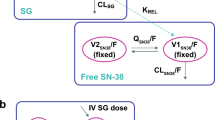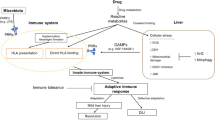Abstract
Purpose
To compare the pharmacokinetic (PK) parameters of a single dose of erlotinib in cancer patients with moderate hepatic impairment (MHI) to those of cancer patients with adequate hepatic function (AHF).
Methods
Cancer patients with either AHF or MHI were treated with a single 150 mg dose of erlotinib on day 1 only followed by 96 h of plasma sampling for PK assessment. From day 5, patients were allowed to continue daily erlotinib in a maintenance phase. Non-smoking patients were stratified into an AHF cohort (total bilirubin ≤ upper limit of normal [ULN] and ALT/AST ≤ 1.5 X ULN) or a MHI cohort (Child-Pugh score of 7–9). The frequency of adverse events and laboratory changes were assessed.
Results
Thirty-six patients, 21 with AHF and 15 with MHI, received at least one dose of erlotinib. The PK of erlotinib was similar between the two cohorts with a median C max of 1.09 versus 0.828 μg/mL and corresponding median AUC0−t 29.3 versus 30.5 μg h/mL for the AHF and MHI cohorts, respectively. Adverse events from erlotinib in cancer patients with MHI were consistent with the known safety profile.
Conclusions
The PK and safety profiles of erlotinib in patients with MHI were similar to those with AHF. As a result, a reduced starting dose of erlotinib in patients with MHI is not required and treatment should be guided by patients’ tolerability.

Similar content being viewed by others
Abbreviations
- AHF:
-
Adequate hepatic function
- MHI:
-
Moderate hepatic impairment
References
Ciardiello F, Tortora G (2008) EGFR antagonists in cancer treatment. N Engl J Med 358:1160–1174
Shepherd FA, Rodrigues Pereira J, Ciuleanu T et al (2005) Erlotinib in previously treated non-small-cell lung cancer. N Engl J Med 353:123–132
Moore MJ, Goldstein D, Hamm J et al (2007) Erlotinib plus gemcitabine compared with gemcitabine alone in patients with advanced pancreatic cancer: a phase III trial of the National Cancer Institute of Canada Clinical Trials Group. J Clin Oncol 25:1960–1966
Tarceva [package insert] (2011) Genentech USA, Inc., South San Francisco, CA
van Erp NP, Gelderblom H, Guchelaar HJ (2009) Clinical pharmacokinetics of tyrosine kinase inhibitors. Cancer Treat Rev 35:692–706
Hughes AN, O’Brien ME, Petty WJ et al (2009) Overcoming CYP1A1/1A2 mediated induction of metabolism by escalating erlotinib dose in current smokers. J Clin Oncol 27:1220–1226
Lu JF, Eppler SM, Wolf J et al (2006) Clinical pharmacokinetics of erlotinib in patients with solid tumor and exposure-safety relationships in patients with non-small cell lug cancer. Clin Pharmacol Ther 80:136–145
Guidance for industry pharmacokinetics in patients with impaired hepatic function: study design, data analysis, and impact on dosing and labeling. US department of health and human services food and drug administration center for drug evaluation and research (CDER) Center for biologics evaluation and research (CBER), May 2003
Perez-Soler R, Chachoua A, Hammond LA, Rowinsky EK et al (2004) Determinants of tumor response and survival with erlotinib in patients with non-small-cell lung cancer. J Clin Oncol 22(16):3238–3247
Johnson JR, Cohen M, Sridhara R et al (2005) Approval summary for erlotinib for treatment of patients with locally advanced or metastatic non-small cell lung cancer after failure of at least one prior chemotherapy regimen. Clin Cancer Res 11:6414–6421
Pugh RH, Murray-Lyon IM, Dawson JL et al (1973) Transection of the esophagus for bleeding esophageal varices. Br J Surg 60:646–649
α-1 Acid Glycoprotein [Package Insert V4] (2003–2006). Roche Diagnostics Corporation, Indianapolis, IN
Hildalgo M, Siu LL, Neumanaitis J et al (2001) Phase I and pharmacologic study of OSI-774, an epidermal growth factor receptor tyrosine kinase inhibitor, in patients with advanced solid malignancies. J Clin Oncol 19:3267–3279
Thomas F, Rochaix P, White-Koning M et al (2009) Population pharmacokinetics of erlotinib and its pharmacokinetic/pharmacodynamic relationships in head and neck squamous cell carcinoma. Eur J Cancer 45:2316–2323
Rudin CM, Liu W, Desai A et al (2008) Pharmacogenomic and pharmacokinetic determinants of erlotinib toxicity. J Clin Oncol 26:1119–1127
Ling J, Johnson KA, Miao Z et al (2006) Metabolism and excretion of erlotinib, a small molecule inhibitor of epidermal growth factor receptor tyrosine kinase, in healthy male volunteers. Drug Metab Dispos 34:420–426
Miller AA, Murry DJ, Owzar K et al (2007) Phase I and pharmacokinetic study of erlotinib for solid tumors in patients with hepatic or renal dysfunction: CALGB 60101. J Clin Oncol 25:3055–3060
Herbst RS, Prager D, Hermann R et al (2005) TRIBUTE: a phase III trial of erlotinib hydrochloride (OSI-774) combined with carboplatin and paclitaxel chemotherapy in advanced non-small-cell lung cancer. J Clin Oncol 23:5892–5899
Philip PA, Mahoney MR, Allmer C et al (2005) Phase II study of Erlotinib (OSI-774) in patients with advanced hepatocellular cancer. J Clin Oncol 23:6657–6663
Philip PA, Mahoney MR, Allmer C et al (2006) Phase II study of erlotinib in patients with advanced biliary cancer. J Clin Oncol 24:3069–3074
Forsythe B, Faulkner K (2004) Overview of the tolerability of gefitinib (IRESSA) monotherapy: clinical experience in non-small-cell lung cancer. Drug Saf 27:1081–1092
Dragovich T, McCoy S, Fenoglio-Preiser CM et al (2006) Phase II trial of erlotinib in gastroesophageal junction and gastric adenocarcinomas: SWOG 0127. J Clin Oncol 24:4922–4927
Ramanarayanan J, Scarpace SL (2007) Acute drug induced hepatitis due to erlotinib. JOP J Pancreas (Online) 8:39–43
Saif MW (2008) Erlotinib-induced acute hepatitis in a patient with pancreatic cancer. Clin Adv Hematol Oncol 6:191–199
Ho C, Davis J, Anderson F, Bebb G, Murray N (2005) Side effects related to cancer treatment: CASE 1. Hepatitis following treatment with gefitinib. J Clin Oncol 23:8531–8533
Carlini P, Papaldo P, Fabi A et al (2006) Liver toxicity after treatment with gefitinib and anastrozole: drug–drug interactions through cytochrome p450? J Clin Oncol 24:e60–e61
Patel H, Egorin MJ, Remick SC et al (2004) Comparison of Child-Pugh (CP) criteria and NCI organ dysfunction working group (NCI-ODWG) criteria for hepatic dysfunction (HD): implications for chemotherapy dosing [abstract]. Proc Am Soc Clin Oncol 22:6051
Saif MW (2008) Hepatic failure and hepatorenal syndrome secondary to erlotinib. Safety reminder. J Pancreas (Online) 9:748–752
Acknowledgments
The Grant support for this study is given by OSI Pharmaceuticals, Inc. (Boulder, CO).
Author information
Authors and Affiliations
Corresponding author
Rights and permissions
About this article
Cite this article
O’Bryant, C.L., Haluska, P., Rosen, L. et al. An open-label study to describe pharmacokinetic parameters of erlotinib in patients with advanced solid tumors with adequate and moderately impaired hepatic function. Cancer Chemother Pharmacol 69, 605–612 (2012). https://doi.org/10.1007/s00280-011-1733-6
Received:
Accepted:
Published:
Issue Date:
DOI: https://doi.org/10.1007/s00280-011-1733-6




